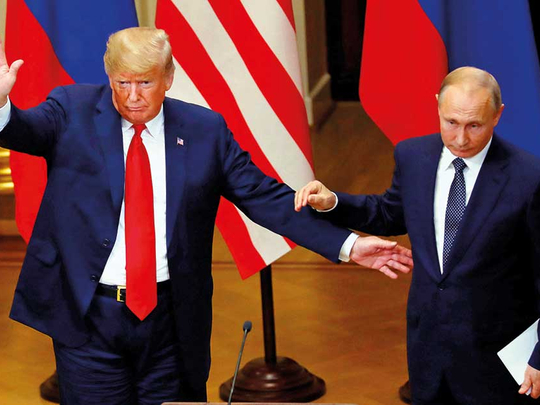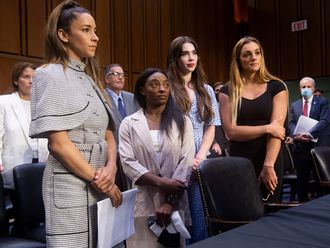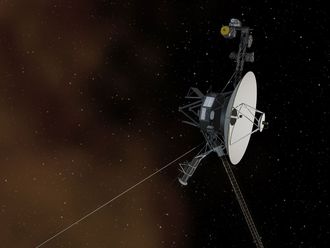
WASHINGTON: Under unrelenting pressure from congressional Republicans, his own advisers, and his allies on Fox News, President Donald Trump abruptly reversed course on Tuesday and claimed he had misspoken during a news conference with President Vladimir Putin about whether Russia tried to influence the 2016 presidential election.
Trump, reading from a script, said he believed the assessment of the nation’s intelligence agencies that Russia had interfered in the campaign after having seeming to have accepted Putin’s assertion the day before that Russia was not involved.
The misunderstanding, he said, grew out of an unsuccessful attempt to use a double negative when he answered a question about whether he believed Putin or his intelligence agencies.
“My people came to me,” he said in Helsinki on Monday. “They said they think it’s Russia. I have President Putin; he just said it’s not Russia. I will say this: I don’t see any reason why it would be.”
On Tuesday he said that he had misspoken. “The sentence should have been, ‘I don’t see any reason why it wouldn’t be Russia,’ sort of a double negative,” the president said. “So you can put that in and I think that probably clarifies things pretty good.”
He also insisted that he has “on numerous occasions noted our intelligence findings that Russians attempted to interfere in our elections.” He did not mention the far greater number of occasions on which he has sown doubt about whether Russia meddled.
Trump also did not retract or explain his withering attack on the FBI and the Justice Department for investigating his campaign’s ties to Russia. He did not withdraw his assertion, standing next to Putin, that the Russian leader had offered an “extremely strong and powerful” denial of involvement during their 2-1/2-hour meeting. And he did not amend his answer to a question about whether he believed Putin or officials like Dan Coats, his director of national intelligence.
Trump said there were “two thoughts” on the matter, and “I have confidence in both parties.”
New era of cooperation
It was a hastily arranged, somewhat haphazard effort to defuse a sudden political crisis that had eclipsed the president’s trip to Europe and his meeting with Putin and the leaders of Nato members and threatened to overwhelm the White House. Dozens of Republicans distanced themselves from the president’s remarks; Democrats called for hearings; and some critics even suggested his conduct, on foreign soil, rose to the level of treason.
Aides said the episode reflected how the persistent questions about Trump’s ties to Russia have all but paralysed the president. Baffled by his solicitous tone toward Putin, some people close to Trump have concluded that he feels vulnerable to Putin, even if it is in his own mind, rather than because of any damaging information possessed by the Russians.
Even as he walked back his remarks, Trump repeated his assertion that there was no evidence of collusion between his campaign and the Russians. That line was scribbled in black marker onto a typewritten sheet of remarks on the table before him.
At one point during his remarks, the TV lights in the Cabinet Room, where Trump was meeting with lawmakers, switched off, plunging the room into gloomy shadows. “Whoops, they just turned off the lights,” Trump joked. “That must be the intelligence agencies.”
Barely 24 hours earlier, the president had stood next to Putin under the glittering chandeliers of a ballroom in Helsinki, telling aides after the news conference wrapped up that he was happy with how it had gone. In an interview afterward with the Fox News host, Sean Hannity, the president was upbeat, describing the meeting with Putin that preceded it as productive and speaking of a new era of cooperation with Russia.
As he flew home on Air Force One, however, Trump’s mood darkened, according to aides. He watched coverage of himself on a flat-screen television hung above the leather sofas in his office. He read briefing papers, then looked back at the TV. He snapped at aides, complaining that the coverage was “so negative.”
Trump’s mood on Air Force One eventually got better, and he watched some of the Home Run Derby staged in Washington as part of the All-Star Game, according to another person briefed on what took place.
But by Tuesday morning, it was clear Trump could not rely on support from even his most die-hard allies. On Fox & Friends, his favourite morning TV programme, the host, Brian Kilmeade, spoke directly into the camera, as if assuming Trump was watching.
“From the day you came down the escalator, you shocked the world,” Kilmeade said. “From November, when everyone had you losing, you shocked the world. It wasn’t because of Russia, but Russia’s goal was to upend the electoral process. They hate democracy.”
He referred to President John F. Kennedy, saying, “Kennedy would love to have undone his first meeting with Khrushchev,” before delivering his pitch: “This is something that needs to be corrected.”
Meanwhile, the Senate Republican leader, Sen. Mitch McConnell of Kentucky, showed the pressure Republicans were under to respond to Trump. After curtly telling reporters Monday that Russia was not a friend of the US, McConnell went further, warning that Congress would take measures against Russia if it continued to meddle.
“The Russians need to know there are a lot of us who fully understand what happened in 2016,” he said, “and it better not happen in 2018.”
At the White House, aides added their voices to the chorus of outsiders. The new communications director, Bill Shine, whose last job was running Fox News, has a particular ability to connect with the president. Aides said he was able to help persuade Trump that a change had to be made soon.
The chief of staff, John F. Kelly, was frustrated and urged people to talk to the president, according to two people familiar with the discussions. The more outside voices that Trump heard, his aides believed, the greater chance that he would agree to shift course.
Later in the morning, Trump told aides he realised he needed to make a correction, according to the person who was briefed. His team met briefly to discuss what to say, and the speechwriter, Stephen Miller, drafted something that was rewritten several times. Vice President Mike Pence weighed in on it at one point before the president read his statement to reporters.












